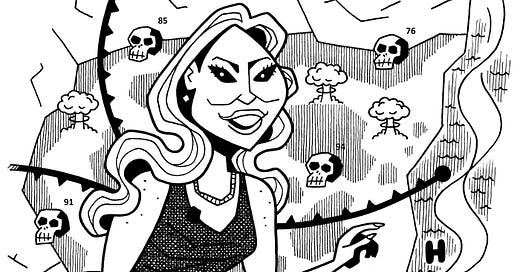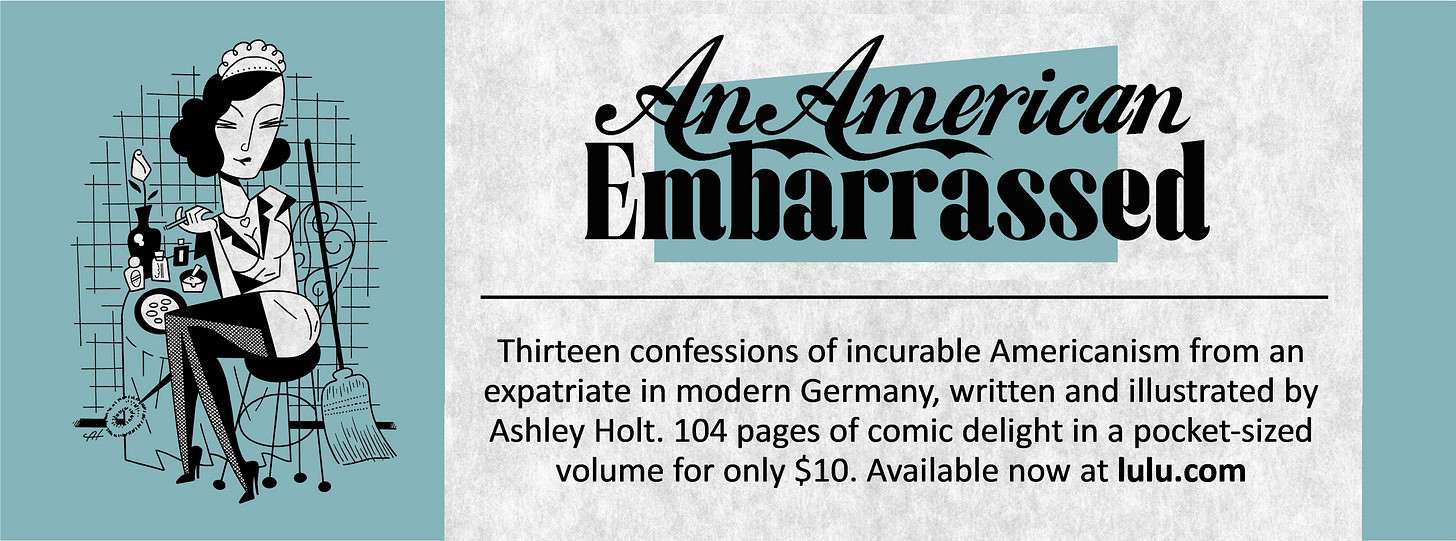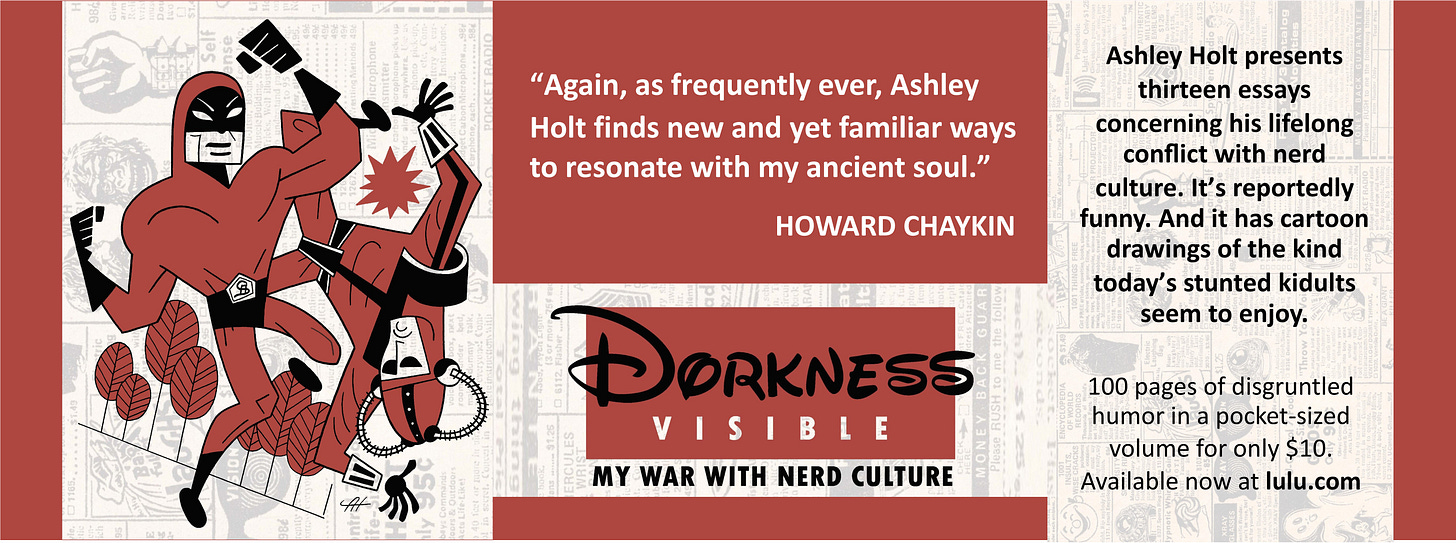I took the Myers-Briggs personality test online once. Well, multiple times, actually. Not that I put much stock in that sort of psychological typecasting—I always neglect to write down the four-letter designation for my M-B species. With any such clickbait personality quiz, I’m not really interested in which muppet I am or what level of authoritarianism I embody (23%—lower than average, but high enough to keep me out of the more prestigious Antifa gangs). I just like being interviewed.
And so it came to pass that one of these identi-quizzes featured an intriguing question. Or rather, a statement, as the quiz was laid out in the form of pronouncements with which the quizzer could agree or disagree. And the first statement presented for consideration was “I think nuclear war would be kind of interesting.”
As the group huggers say, I felt seen. It gave me an atomic-level jolt of recognition, as if a hidden aspect of my nature, the skeletons in my basement freezer, had been revealed. Consider that kids of my generation were raised through the 1970s with the specter of Berlin-Walled nuclear detente still breathing down our polyester collars. Documentaries, TV news specials, and animated cartoons all wrestled with mankind’s radiated inevitability.* Our tornado drills in elementary school did double duty as nuke practice. We thought about the mushroom-cloudy skies of doomsday a lot. And we were given ample opportunity, huddled in the hallway with our arms covering our heads, to decide for ourselves whether the notion of post-apocalyptic survivalism was intriguing, terrifying, or a fusion of the two.
And while waiting for Brezhnev to sizzle our strip malls, we had regular dress rehearsals for city-wide devastation in the form of hurricanes. Memory tends to exaggerate, but it seems we faced down a Category Five land-leveler every weekend in our coastal Carolina storm magnet. Most of the time, the mega-hyped Hurricane Bruno or Agnes or Hildegard withered before reaching the shore, leaving only overturned lawn chairs in its wake. At worst, storm victims endured an 8-hour power outage that would force them to throw out the leftover Lunchables.†
But sometimes we got walloped with the Big One, clearing the car lots and hurling oaks through the Quizno’s. And in the aftermath of this destruction, buzzing with the hum of chainsaws and generators, bereft of potable water or refrigeration, inspiring looting, gouging, and fistfights over ice, one was often reminded of what a post-bomb life could be like. And no one was more attuned to a probable Armageddon than my father.
J. E. Holt, my fire chief dad, stricken with cat-like paranoia where homewrecking hazards were concerned, was a notorious weather obsessive. He remained largely oblivious to world events or fashion trends but was consistently hip to low-pressure fronts and overnight freezes. This was likely a holdover from his childhood on the farm, where too much or too little of the weather could mean no collards or turnip squash for market that season. (And that could mean losing another thumb to the cotton mill at Textilico to make ends meet.) Storm or no, rain or shine, John Earl was monitoring the Weather Channel, a broadcasting innovation seemingly launched with him exclusively in mind.
“Strong winds coming on Friday,” he would announce to a houseful of who-gives-a-shit.
When the big storms came, Coleman stoves and lanterns emerged from the closet. Mold-scented sleeping bags unfurled, regardless of our having actual beds in the next room. This was not camping gear, mind you, for camping was a suicidal activity full of avoidable dangers. This was survival gear. Ice, milk, and bread had been stockpiled. Battery-powered radio for updates. Bandages and snakebite kits (the floods come with water moccasins). He even had unopened packs of Army rations, which mercifully remained sealed.‡ We would hunker down in this storm shelter, formerly known as the living room, and ride out the howling winds of fury.
The next morning would typically reveal only a moister-than-usual lawn, covered in twigs and leaves. Perhaps a neighbor’s toolshed got flattened by a collapsed palmetto or a jettisoned paint can took out a Pontiac’s headlight. Not exactly a holocaust, but the anticipation had been thrilling. And whether facing a mere tropical storm or one of our major, tree-leveling, roof-stripping, trailer-launching, boats-on-top-of-the-Holiday Inn wastelands, for my father, the preparedness had been about more than just safety. It had been fun. This—not trips to Six Flags or dinner at Denny’s or canoeing at Congaree—was what my father considered quality family time.
Because what my father suspected—or what I suspect he suspected—was that a worst-case-scenario storm, riddled with twisters and lightning, obliterating homes, offices, and nail salons, making a landfill of everything we held dear, would be kind of interesting. And scrounging for scraps in the ruins of Kroger would constitute family togetherness at its most elemental. Like many faithful fundamentalists, gearing up for the End Times invigorated him.
And having to a large extent inherited this point of view, one that Briggs and Myers agreed was worth keeping an eye on, I can tell you that being outspokenly pro-apocalypse does tend to disquiet most dinner parties. Jittery types would rather not ponder a post-nuclear wasteland because just going without Jeopardy during a thunderstorm freaks them exceedingly.
I believe what throwbacks like my father and I appreciate about civilization’s demise is that the primary targets of monster storms, tornadic or atomic, are the symptoms of modernity. Electricity is the first to go, deadening the microwaves and Mario Carts, forcing the survivors to huddle in candlelight, whittling pinewood and thumbing through almanacs like log-cabin Fondas. For my father, hibernating survivalism returned him to his un-air-conditioned boyhood, those pioneering days of soil tilling and smallpox, before the MTVs and the 3-D hologram Star Wars specials started making all that newfangled noise.
Tabula rasa. Back to the Neanderthal essentials. Like hitting the pause button on our spasmatic Now, giving us a break from civilization’s tickertape and robocalls to calmly contemplate our radioactive horizons. Or maybe it’s just that the plane crashing into the mountain gives one a momentary reprieve from worrying about the plane crashing into the mountain. Not a pause, but a fast-forward from “circling” to “drain.” Better to confront the earth-shattering kaboom than a slow death by microplastics.
And I’m as ready as anyone in this swamp-drained Trumptopia to skip to the grand finale. Let’s call it futility fatigue. After all, we’ve petitioned and canvassed and marched, we’ve separated our recycling and given up aerosols. We got a little girl named Greta to fat-shame the one percent. And still Hurricane Elon is hovering at our shores, eager to send us all to the shelters and tent encampments. Well, I say we settle in for a good hunker and let our ice-melting destiny make Mad Maxes of us all. Like the brimstone Baptists of my homeland, I intend to gawk in wonder as fire rains from the heavens and sigh, “Well, finally! A little retribution for our sins!”
Sure, I’m an atheist, but there’s more than one way to burn a bush.
Too bleak? Defeatist? Wallowing in privileged misanthropy? Well, guilty as charged. You see, I told a fib upstairs; I know which muppet I am. Oscar, of course. Not only transcendently disgruntled but sealed in a personal fallout shelter, sequestered from humanity’s race to extinction.
Maybe he’s given up hope. But I’ll bet he’s still monitoring the Weather Channel in there, checking to see which way the winds will blow.
- A.H.
* Everyone seems to remember the well-publicized TV drama, The Day After, but worse for we South Carolinians was the no-budget Special Bulletin, which presented nuclear destruction in the form of a TV news broadcast, ala, Orson Welles’ infamous War of the Worlds radio show, and took place in our Russia-targeted hometown of Charleston. The local NBC affiliate gave up on the “dramatization” caption and began flashing the words “THIS IS A MOVIE!!!!” at the bottom of the screen instead.
† Lunchables: Not quite lunch, but ABLE to become lunch if only we believe.
‡ My father kept an unopened can of turtle soup in the cabinet as a gag. I lived in fear of a natural disaster so great that it might become our last morsel of sustenance.
(And let’s not forget Ashley’s website, jam-packed with portraits and other drawings, his highly-affordable prints and books currently available, his eagerness for your portrait commission, and his contact email, thrdgll@gmail.com, where he longs to hear from you.)








In October of 1962, when I was eight, mom and dad piled my older sister and I into the bench seat of our pickup truck and highballed it to a nondescript hotel in Barrago Springs, CA. On the way, they stopped for ten cent vanilla frosties. We thought it was an unplanned vacation. They didn't mention anything about getting out of the blast zone. I did however get serious radiation burns from spending too much time in the swimming pool.... War is hell.